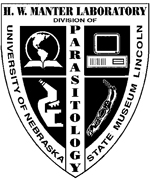Parasitology, Harold W. Manter Laboratory of

Harold W. Manter Laboratory of Parasitology: Library Materials
Document Type
Article
Date of this Version
11-4-2012
Citation
Ramiro et al.: Molecular evolution and phylogenetics of rodent malaria parasites. BMC Evolutionary Biology 2012 12:219.
Abstract
Background: Over the last 6 decades, rodent Plasmodium species have become key model systems for understanding the basic biology of malaria parasites. Cell and molecular parasitology have made much progress in identifying genes underpinning interactions between malaria parasites, hosts, and vectors. However, little attention has been paid to the evolutionary genetics of parasites, which provides context for identifying potential therapeutic targets and for understanding the selective forces shaping parasites in natural populations. Additionally, understanding the relationships between species, subspecies, and strains, is necessary to maximize the utility of rodent malaria parasites as medically important infectious disease models, and for investigating the evolution of host-parasite interactions.
Results: Here, we collected multi-locus sequence data from 58 rodent malaria genotypes distributed throughout 13 subspecies belonging to P. berghei, P. chabaudi, P. vinckei, and P. yoelii. We employ multi-locus methods to infer the subspecies phylogeny, and use population-genetic approaches to elucidate the selective patterns shaping the evolution of these organisms. Our results reveal a time-line for the evolution of rodent Plasmodium and suggest that all the subspecies are independently evolving lineages (i.e. species). We show that estimates of species-level polymorphism are inflated if subspecies are not explicitly recognized, and detect purifying selection at most loci.
Conclusions: Our work resolves previous inconsistencies in the phylogeny of rodent malaria parasites, provides estimates of important parameters that relate to the parasite’s natural history and provides a much-needed evolutionary context for understanding diverse biological aspects from the cross-reactivity of immune responses to parasite mating patterns.


Comments
Open access.